| Lindback and Provost's Awards—Sketches of the 2011 Winners |
|
April 12, 2011, Volume 57, No. 29
|
|
Since 1961, Lindback Awards—for members of the standing faculty—have been a springtime tradition at Penn. The Provost’s Awards—for full- and part-time associated faculty and academic support staff—have been given inconjunction with the Lindbacks since 1988. Another University-wide award to honor faculty who teach and mentor doctoral students began in 2003 for members of the standing or associated faculty in any school offering the PhD. Below are profiles and excerpts from colleagues’ and students’ letters of recommendation for this year’s winners.
Teaching Award Reception: April 25
All members of the University community are cordially invited to a reception honoring the recipients of the Christian R. and Mary F. Lindback
Foundation Awards for Distinguished Teaching and the Provost’s Awards for Teaching Excellence by Non-Standing Faculty
as well as the Provost’s Awards for Distinguished PhD Teaching and Mentoring
Monday, April 25 at 5 p.m., Hall of Flags, Houston Hall. |
Lindback Awards |
|
Non-Health Schools
|
Health Schools
|
Provost's Awards
|
Christian R. and Mary F. Lindback Awards at the
University of Pennsylvania:
Awarded for Distinguished Teaching
The Lindback Awards for Distinguished Teaching at the University of Pennsylvania were established in 1961 with the help of the Christian R. and Mary F. Lindback Foundation. Christian Lindback was president and principal of Abbotts Dairies, Inc. and a trustee of Bucknell University. The Foundation established Lindback Awards for Distinguished Teaching at colleges and universities throughout the Abbotts Dairies, Inc.’s service area in New Jersey, Pennsylvania, Maryland, Delaware and Virginia.
See www.archives.upenn.edu/people/notables/awards/lindback.html for the previous recipients.
|
Lindback Awards–Non-Health Schools
Sarah Barringer Gordon
 |
Sarah Barringer Gordon, Arlin M. Adams Professor of Constitutional Law in the School of Law and Professor of History in the School of Arts and Sciences, has taught at Penn since 1994. “She has charisma backed by intellectual gravitas,” observes a colleague. “She draws students out, brings out their best thinking, leads riveting discussions, and never compromises her high academic standards.” Students and colleagues at all levels admire “the moral seriousness with which she approaches her scholarly work.” As an undergraduate reports, “She approaches the study of history with humility and reverence for those who asked the difficult questions about our society, and embodies the value of seeking truth in her teaching.” In particular, notes a colleague, “She helped me focus on the human element underlying legal texts and principles. She encouraged me to look for the people and the stories behind cases, buildings, books and ideas.” As a pioneer of legal history, she “personifies the strengths of cross-disciplinary teaching and scholarship at Penn,” and the most “fundamental lesson she teaches, both in the classroom and out,” writes a graduate student, is “how to be a good citizen of one’s community.” Concludes another student: “If I am able to convey to my students just one-tenth of Professor Gordon’s warmth, encouragement, brilliance, compassion and humility, then her love of learning, law and justice extends very far indeed.”
|
Scott Poethig
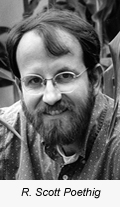 |
Scott Poethig, Patricia M. Williams Professor of Biology in the School of Arts and Sciences, has taught at Penn since 1983. “Professor Poethig’s greatest gift as a teacher,” numerous former students attest, “is his ability to transmit his passion for the subject. … ‘You made mozzarella cheese by hand, tested the Wawa soy crisps for modified genes, witnessed a calf being born at a high-tech dairy farm, and helped local high schools with a fresh-food gardening initiative?’ is often the wide-eyed response peers from other institutions exhibit.” As another former student recalls, he “managed to create a syllabus unlike any I had seen before, complete with multiple field trips, scientific papers as well as popular novels for assigned reading, interesting labs which often resulted in homemade treats for the students, a well-known guest lecturer, movies, and a list of semester projects which catered to those yearning to develop their green thumbs as well as to future investigators of fad diet supplements.” For these students, “his inspiration came from the fact that we all saw how important the subject matter was as a life pursuit for him, and this in turn became infectious for all of us…not only for the course material but also for our own pursuits and interests. … you can see how much enjoyment he takes from teaching, and how passionate he is to share his knowledge with Penn students.” As one student succinctly notes, “I have never known a better teacher and I’d be surprised if I ever will.”
|
Jean-Michel Rabaté
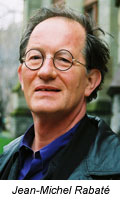 |
Jean-Michel Rabaté, Vartan Gregorian Professor in the Humanities and Professor of English and Comparative Literature in the School of Arts and Sciences, has taught at Penn since 1992. A world-renowned scholar of modernist literature and theory, “he is the smartest man I know” who “knows everything” and “has read more than you will read in your whole life.” While he is above all “an incredible intellectual resource,” his “colleagues and students both recognize that this combination of high-powered productivity and devoted, attentive concern for students is rare.” Teaching at every level from BFS to LPS and consistently innovating new courses, he “has proven to be one of the university’s most ubiquitous and accessible figures” and yet is “among the most approachable professors I had at Penn—eager to discuss material at length outside the classroom and talk through any concerns I had.” Indeed, writes another student, his “ability to listen actively, responding with detail and acute attention to questions and comments in the classroom, is a rare ability.” Above all, he is “the most intellectually stimulating professor I have had at Penn. He is always able to pique my curiosity for the subject matter and push my exploration of our topics of discussion beyond the classroom.” “Taking a course with him,” writes one student, “is somewhat like sitting with Plato.” In the end, he “creates an ethos of respect between teacher and student in the classroom that…enables the students to feel the possibility of learning, to think critically and creatively, and to encounter a bounty of new ideas and thoughts. He transmits a wonder.”
|
Greg Urban
 |
Greg Urban, Arthur Hobson Quinn Professor of Anthropology in the School of Arts and Sciences, has taught at Penn since 1994. “One of the most captivating lecturers at Penn,” he is celebrated for his “ability to solidify even the most abstract notions of…cultural anthropology in fascinating and informative examples which are readily understood by undergraduates.” He is “particularly interested,” notes a colleague, “in making arcane anthropological concepts relevant to students’ daily lives. … he seeks to help students think interrogatively—to pose interesting questions about the world.” He “is constantly connecting complex and sometimes parochial anthropological theories to everyday popular culture,” confirms one of his graduate teaching assistants, “allowing students to understand how these ideas are relevant to their own lives and careers, whatever their major.” Observes one of those students: “Among [his] many talents is his ability to make each student feel unique and appreciated by taking the time to find out about interests outside just the classroom topic.” At the same time, “he is a consummate intellectual and the wide reach of his scholarly interests and expertise is truly impressive. …He is genuinely excited by ideas, across a broad range of scientific and humanistic fields, and his excitement is contagious. … His intellectual curiosity and his passion for ideas are inspiring and truly infectious.”
|
Lindback Awards–Health Schools
Peter Dodson
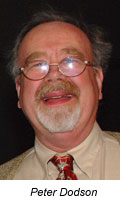 |
Peter Dodson, Professor of Anatomy in the School of Veterinary Medicine, has taught at Penn since 1974. A legendary dinosaur paleontologist and mentor of both graduate and undergraduate students, he “is one of the best teachers that I have ever encountered, as well as one of the best human beings that I have ever had the pleasure of knowing. His desire to teach is unending.” Generations of students and colleagues attest that he “has an infectious excitement for the material that he teaches. His imaginative ways of conveying concepts have left a lasting impact on my understanding of certain subjects and even more so on the way that I think.” Moreover, he “is not simply a world authority in his field of dinosaur paleontology; he is a true intellectual, in the sense of not just seeking to connect his own science to others, but also to the wider areas of human knowledge and experience.” He is “consistently an outspoken and discerning advocate for the best interests of the students” who “truly cares about the well being and the education of the person as a whole” and “ensures that he makes a personal connection with each student by engaging him/her in conversation, all the while using the conversation as a way of reinforcing material and teaching new concepts.” As one student concludes, “I learned [an] important lesson from Peter: life as a scientist (or university faculty member) does not mean sacrificing important personal character traits like kindness and generosity.” |
Rachel Kelz
 |
Rachel Kelz, Assistant Professor of Surgery in the School of Medicine, has taught at Penn since 1998. “Dr. Kelz has truly been a pioneer in medical education at Penn,” reports one of her students. “As director of the required Surgery 200 clerkship, she has completely restructured the course, fostering an unparalleled interest in surgery among Penn students” and creating, in the words of a colleague, “an enthusiasm for surgery as a discipline which was previously unheard of in the department.” She has implemented such key innovations as restrictions in student work hours, student training in catheter placement, and live broadcasting of surgical procedures accompanied by interactive discussions with faculty and residents. Students at all levels attest that “her dedication to student education is unparalleled” and her “relationship to her patients reflects the same inspiring openness and commitment.” They especially appreciate her mentorship in helping them to make informed decisions about medical specialties, even when they do not choose surgery, and work-life balance. Numerous students particularly note that her “ability to be an excellent surgeon and still devote time and energy to her family is really an inspiration.” As they indicate, “She is a champion for students, and her passion and excitement for education has permeated the spirit and culture of both the undergraduate and graduate education levels. … Dr. Kelz teaches with everything she has, and as a result is truly irreplaceable.”
|
Stephen Kimmel
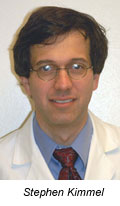 |
Stephen Kimmel, Associate Professor of Medicine in the School of Medicine, has taught at Penn since 1994. “His classroom and mentoring skills,” reports a colleague, “engage his students in a demanding and extraordinarily coherent fashion, building not only their understanding of epidemiology, but instilling an enduring passion for deep intellectual engagement.” In particular, a student notes, he “has an uncanny ability to deconstruct seemingly complex problems down to their essential components, allowing him to give valuable advice on how to identify the critical question of a scientific problem and then find the best approach toward answering it.” With “an aura of authority and approachability that encourages students to be attentive to his material as well as willing to enter into constructive dialogue,” he “always managed to strike the perfect balance of guiding me as a student, yet allowing me the freedom to develop my independence as a researcher. … His vision of what is fundamental toward the professional development of a successful clinical investigator is clear, yet his ability to adapt this vision to another individual’s personal career goals is outstanding.” In both classroom and weekly conference settings, “it was evident that he had an extraordinary ability to rapidly analyze any research topic, identify key relevant points, and offer positive and practical criticism for improvement. Dr. Kimmel’s example in this regard has been truly inspiring to young researchers—these are skills we all seek to learn, and he repeatedly demonstrates how we can master them.”
|
Jennifer Pinto-Martin
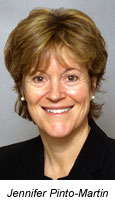 |
Jennifer Pinto-Martin, Viola MacInnes/Independence Professor of Nursing in the School of Nursing, has taught at Penn since 1987. A worldwide leader in autism research, she “reflects and defines a new era of interdisciplinary academics. …Even within a university that values interdisciplinarity, she stands out because of the breadth and extent of her teaching across a wide range of disciplines, such as social policy, nursing, education, city and regional planning, law, communications, and medicine.” In all these contexts, she “engages students in a way that makes them excited about joining her on a voyage of discovery,” especially through “her ability to bring epidemiology to life in the classroom” and integrate hands-on epidemiological research into nursing pedagogy. “Dr. Pinto-Martin transformed a large group of jaded university students into intrigued, wide-eyed ‘detectives,’” reports one former student. “We spent the semester learning that this ‘detective’ work was called epidemiology, and it came with quite an expansive toolbox of study designs, sampling techniques, and analytic methods.” She “demands perfection through critical thinking yet works with the student to create an intellectually stimulating experience,” especially as “she has a very generous way of including students in the development of her own research, all the while allowing them to find their own interests and further their own ideas.” In the end, she is “most respected for the individual time and attention she devotes to mentoring students and in encouraging them to explore their own research questions. … This flexibility and ability to gauge what a student needs makes her a truly outstanding mentor.”
|
Provost’s Award for Teaching Excellence by Non-Standing Faculty
In October of 1987, the Office of the Provost announced the establishment of two additional Penn teaching awards—one in a Health School and one in a Non-Health School—to be given annually in recognition of distinguished teaching by associated faculty or academic support staff. The guidelines for the selection of the award recipients are the same as those given for the Lindback Awards, and the selection processes and deadlines are the same.
|
Benoit Dubé
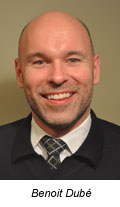 |
Benoit Dubé, Assistant Professor of Clinical Psychiatry in the School of Medicine, has taught at Penn since 2001. As director of the psychiatry clerkship for medical students, “Doc Benoit” is renowned not only for his teaching skills but also for the individualized attention that he pays to each student, especially his empathy—and tangible help—in the face of personal emergencies. “Dr. Dubé,” reports one of them, “is an example of the very lessons that he is teaching…patient, honest, respectful, collaborative, open-minded, and a great listener—qualities that we should strive to possess as future doctors.” Further, “what really makes Dr. Dubé such an effective and down-to-earth teacher is his singular ability to ‘teach by listening.’” In particular, he “represents an important voice for those who are often overlooked or underserved in medicine, namely the lesbian, gay, bisexual and transgendered patients. The frank and open discussion he nurtures around these issues, as well as the epidemiological support he offered in his lectures to encourage more attentive care, has sensitized me and my classmates to the unique needs of this patient population and better prepared us to be compassionate, well-informed healthcare providers.” In the end, “he meets us where we are and brings us up to where we need to be. Even more importantly, he prods us to think beyond a lecture or single patient, encouraging us to consider bigger questions. In this way, even a single interaction with Dr. Dubé is a dynamic learning experience.”
|
Rebecca Stein
 |
Rebecca Stein, Senior Lecturer in the Department of Economics of the School of Arts and Sciences, has taught at Penn since 1998. As the instructor of Introductory Microeconomics, co-instructor of Introduction to Economics for Wharton Students, and supervisor of undergraduate and graduate recitation instructors for both courses, she “is able,” in the words of an admiring colleague, “to give students personal attention even when she is teaching three sections at a time with more than 100 students in each.” Students confirm that, in spite of the size and popularity of these courses, “it felt like she wasn’t lecturing, but rather engaging the students in a discussion; it felt like a small class.” They especially appreciate her efforts to “teach the skill of thinking like an economist” and “bring in real-world examples to allow students to make connections,” including “her penchant for selecting pop music to play before each class and then tying it to the subject matter.” She maintains extensive office hours to help students solve problems and innovated a new program called Groups for Economic Applied Thinking, in which students work together to apply economic concepts to challenging real-world situations. “She represented economics in a way that was exciting, practical, and realistic and always had great examples and relevant cases to share with us,” writes one appreciative student, and another affirms: “Never have I met anyone with such a capacity to teach. She could teach economics to a preschooler, simply because she is just that good at explaining.”
|
Provost’s Award for Distinguished Ph.D. Teaching and Mentoring
Excellence in PhD education is the hallmark of a great university. That excellence depends upon the skill and commitment of faculty mentors. The Provost’s Award for Distinguished PhD Teaching and Mentoring was established specifically to honor faculty who mentor PhD students. The prize is intended to underscore the University’s emphasis on graduate education, by celebrating the accomplishments of faculty who show special distinction in doctoral education.
|
Lawrence Brown
 |
Lawrence Brown, Miers Busch Professor in the Department of Statistics in the Wharton School, has taught at Penn since 1994. “The leading theoretical statistician in the world” and “one of the best PhD advisors ever,” he is “all you could hope for in an advisor” and “has a special way of finding important problems that highlight the talents of each of his doctoral students.” Dozens of colleagues attest to his personal modesty and devotion to mentoring generations of students who go on to become the leading figures in the field; “willing to advise any student, weak or strong,” in the words of a colleague, “he somehow manages to bring out their full potential. Getting to know each and every one of them, he consistently manages to come up with a fertile new research direction that is suitably tailored to their interests and talents. … In this way, he provides the perfect preparation for an academic research career, giving his students the confidence and self-resourcefulness that is so critical for success.” A renowned host of graduate students for Thanksgiving dinner, he “devotes endless amount of attention and time to each of his students and by doing so he truly portrays what academics is all about: nurturing young minds to investigate new problems and come up with solutions.” His current and former students recently gathered at an international conference in honor of his 70th birthday and presented him with a plaque that read:
Happy Birthday Larry! We Love You! We Thank You! For teaching us how to be successful as a professional and a human; for inspiring us to achieve our full potentials; for taking care of us; ... and for being such a great role model for us. From your blessed students.
|
Paul Guyer
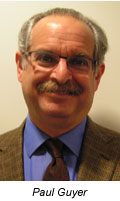 |
Paul Guyer, Florence R. C. Murray Professor in the Humanities and Professor of Philosophy in the School of Arts and Sciences, has taught at Penn since 1982. An internationally recognized scholar of Kant and eighteenth-century philosophy whose “work has done nothing less than revolutionize the field,” he is, reports one of the many former graduate students who is now a distinguished colleague, “an advisor with sweeping knowledge who is eager to share what he knows with his students, but who also wants to help them carve out a space of their own.” His students consistently comment on his “extremely undogmatic” style, through which he “sees his role as allowing his students to develop and defend their own position.” They note his encouragement of interpretations different from his own, a “complete open-mindedness to new ideas and approaches” that “quickly taught me how to hold my own in vigorous debate.” In teaching, reports a former student, he “engaged with the ideas and arguments of historical philosophers as if he were their contemporary, bombarding them with objections from all sides to see whether they can withstand rigorous scrutiny.” Continuing to mentor and offer opportunities to his students long after they embark on their careers, he is, writes a former student, “an intellectual giant… who, through his remarkable talents and integrity as a teacher and mentor, has made it possible for his students to stand on his shoulders and so advance toward new heights in scholarship.”
|
|